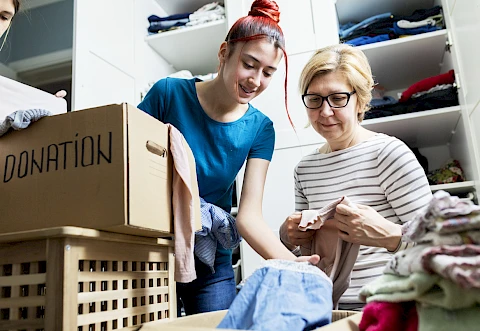
Clutter Awareness Week, observed from August 6 to 12, reminds us of the importance of maintaining a clutter-free environment. For seniors, decluttering significantly improves their safety and well-being. This article guides caregivers in assisting seniors in disposing of unwanted items in a safe and responsible manner. We cover local donation centers, recycling programs, consignment shops, and tips for disposing of non-donatable items.
Recognizing the Challenges
Decluttering can present emotional and physical challenges for seniors. Seniors may form emotional attachments to their belongings, making it hard to let go. Physical limitations can make it difficult to move items, leading to safety concerns. Some seniors find it challenging to overcome procrastination. Caregivers can play a crucial role by offering support and encouragement.
Steps to Start the Decluttering Process
Starting a decluttering project can seem daunting, especially when assisting seniors. However, with a thoughtful approach, it can be a rewarding experience that brings clarity and peace to living spaces. The first step is to assess the clutter situation by identifying the areas that need the most attention. Take a walk through the home and make notes about which rooms or spaces feel the most overwhelming. Once you've identified these areas, set realistic goals and timelines to ensure the process is manageable and not overwhelming. Breaking down the project into smaller tasks can help maintain motivation and focus.
Involving seniors in the decision-making process is necessary, as it provides them with a sense of control and respects their attachment to their belongings. Ask them about their preferences and priorities, and listen to their stories about items that hold sentimental value. This involvement can make the process more meaningful and less stressful for them. Consider starting with easier tasks, like clearing out expired food from the pantry or sorting through old magazines, before moving on to more challenging areas like closets or attics. Encourage open communication, patience, and a positive attitude to ensure the decluttering process is smooth and effective.
Local Donation Centers
Donating unwanted items can be a great way to declutter while helping others. Here are some local donation centers in the Lehigh Valley area:
- Allentown: Goodwill, Salvation Army
- Bethlehem: Habitat for Humanity ReStore, Via Thrift Store
- Kutztown: Kutztown Community Partnership, Salvation Army
- Nazareth: The Attic, Salvation Army
- Whitehall: Goodwill, Plato's Closet
- Schnecksville: Habitat for Humanity ReStore, American Family Services Thrift Store
Most donation centers accept clothing, furniture, household items, and electronics (in working condition). Make sure to clean and pack items appropriately before donating.
Recycling Programs
Recycling is another environmentally friendly way to declutter. Local recycling facilities in Allentown, Bethlehem, and surrounding areas accept various items:
- Paper and Cardboard: Newspapers, magazines, cardboard boxes
- Plastics: Bottles, containers, bags
- Metals: Aluminum cans, tin cans
- Electronics: Computers, cell phones, batteries
Properly sorting recyclables is essential. Remove any food residue, flatten cardboard boxes, and separate items by material type.
Consignment Shops
Consignment shops offer a way to sell unwanted items while earning some money. Benefits include a smaller environmental footprint and recirculation of usable items. Here are some local consignment shops:
- Allentown: The Attic, Plato's Closet
- Bethlehem: Finders Keepers, Kid to Kid
- Kutztown: Kutztown Community Partnership
- Nazareth: Kaleidoscope Consignment, The Attic
- Whitehall: Plato's Closet, Closet Envy
- Schnecksville: American Family Services Thrift Store
When consigning items, ensure they are clean and in good condition. Carefully review the shop's pricing and sale process policies.
Safe Disposal of Non-donatable Items
Not all items can be donated or sold. Identifying such items is the first step in responsible disposal. Hazardous materials like chemicals, batteries, and old medications require special handling. Follow these steps for safe disposal: Hazardous Materials: You need to go to local hazardous waste collection centers. You can recycle broken appliances at electronics recycling facilities. You can also take old and unneeded medicines to a local pharmacy with take-back programs or medication disposal events. Check with your local municipality for specific disposal guidelines and services.
It’s Time to Declutter!
Decluttering can provide a rewarding process that leads to a safer and more comfortable living space for seniors.:Remember as you assess the clutter to set realistic goals, involve seniors, and use local resources. Remember, a clutter-free environment enhances the well-being of seniors. If you need senior care and decluttering assistance and reside in Allentown, Bethlehem, Kutztown, Nazareth, or Schnecksville, don't hesitate to contact us at Senior Helpers Lehigh Valley. We would love to discuss our services for seniors and their caregivers, such as Personal Care and Respite Care.